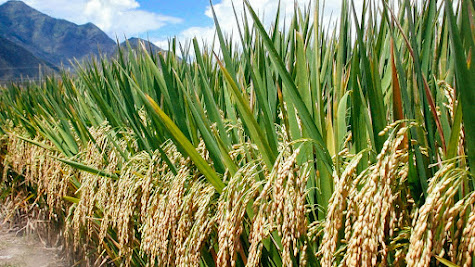'' The global rice crisis '' could be solved with new but proven methods of cultivation. These agroecological approaches require fewer chemicals and less water, but increase yield and reduce greenhouse-gas emissions.
Crops are not only more resilient, they draw carbon down from the atmosphere into soil and root systems.
One example is the System of Rice Intensification [SRI], one of the most cost-effective climate solutions identified in 2017 by Project Drawdown, a non-profit organisation.
SRI involves the wider-spacing of plants and careful management of seedlings and water.
Research shows that water consumption and emissions, mainly methane, can be halved. With 80% less seed, farmer's yields consistently increase, often doubling or more.
Smallholder farmers across Asia and Africa have already adapted these practices. Innovative farmers in Pakistan and Arkansas have shown that SRI can be mechanised and scaled.
SRI is practised in over 60 countries, but still accounts for only 5-10% of global production. Helping farmers change their practices mainly requires non-financial support such as training, demonstration and access to equipment.
The payback to farmers and governments in productivity, food security, water savings and greater resilience to climate stresses will be measured in months.
This is the kind of initiative that should be a priority in Cop28, to be held in Dubai later this year.
The World Students Society thanks : Dr. Adam Parr, Business Fellow at Smith School of Enterprise and the Environment, UNIVERSITY OF OXFORD.

.png)


0 comments:
Post a Comment
Grace A Comment!